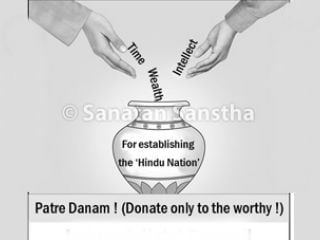1. Act of donation performed by kings in earlier times
‘पात्रे दानम् ।’ is a popular saying. One of the meanings of donation is as follows: ‘After leaving aside the amount needed for expenses from one’s income, the help provided through the remaining amount for social and religious activities.’ Apart from the money, donations can also be made in the form of land, ornaments, clothes (blouse and saree for Devi etc.). In ancient times kings used to donate huge sums to Hindu temples. Wealth of Shri Padmanabh temple in Kerala is not reckoned till date. When Punyashlok Ahilyabai Holkar was a queen, she had used the money she received as income, for restoring and rebuilding many temples. The temples from Varanasi in the north to the Ghruneshwar Shiva temple in the south stand as a proof to this.
2. Ensuring that donated money is used for
right activities is the responsibility of the donors
Many generous individuals give donations to various NGOs considering it as their social obligation. While giving donations, donors must ensure that their money is being spent for appropriate activities and in a right manner. Many social service organizations spend huge amounts from the money received in donations for paying salaries to their full-time workers, office expenses, vehicles etc. In an audit of a social service organization, it was revealed that the money received in donations were spent in 5-star restaurants for lodging and drinks.
3. Donations should be given to the worthy
‘सत्पात्री दान’ is an important saying. Hindu Dharma is called as Sanatan Dharma. Therefore, only those abiding by this Dharma have a potential to acquire God and Final Liberation. To ensure that maximum people derive this benefit, its everyone’s duty to spread awareness of Hindu Dharma in a right manner. It is also essential to take utmost care when donating. It is our duty as defined by Dharma, to support those organizations or institutions that are actively involved in nation building and spreading awareness of Dharma.

4. Sanatan Sanstha has devoted itself for
activities unto nation and Dharma and therefore
donation given to the Sanstha is indeed ‘सत्पात्री दान’
Sanatan Sanstha is the one which has devoted itself towards nation building and spreading awareness of Dharma. Therefore, donations given to this Sanstha is indeed worthy of offering.
5. Difference between donation and offering
Giving an offering is more important than donating. Donation is made from a part of one’s income, whereas offering denotes sacrificing whatever one has, either partly or completely. Seekers who perform spiritual practice under guidance of their Guru, sacrifice their body, mind and wealth unto the service. Even those having undeterred faith on God also fall in the same category. Although the words donation and offering appear similar, the subtle differences between the two are given below:
| Donation | Offering | |
| 1. Medium | Money, land, ornaments etc. in gross form | Body, mind, intellect and wealth (mind and intellect are at subtle level and hence more important) |
| 2. Donors | Middle class, wealthy and businessmen | Seekers, those abiding with Dharma and with detached attitude |
| 3. Spiritual emotion of the donor | – | Spiritual emotion without expectation |
| 4. Proportion of triguns in donor | 30% Raja guna, 30% Tama guna, 40% Sattva guna | Sattva guna exceeding 65% |
| 5. Expectations | Popularity, ‘Society should remember ancestors’ etc. | Non-existent (akin to secret wealth in Tirupati temple trust) |
| 6. Spiritual experiences obtained by donor | Increase in income and profit, few incomplete desires getting fulfilled etc. | Increase in communion with God, spiritual experience of bliss and peace and increase in attitude of detachment. |
| 7. Doership | Present | Absent |
| 8. Disclosure to public | Occurs | Does not occur (does not feel like sharing with others, since the spiritual emotion of ‘I am not the doer’ exists). |
| 9. Proportion of spiritual benefit to the donor | To some extent | Unlimited. |
‘O Gurudev, I express utmost gratitude unto Your Holy feet for giving me the intellect and opportunity to express this thought’

 Sacrifice unto the Absolute Truth
Sacrifice unto the Absolute Truth